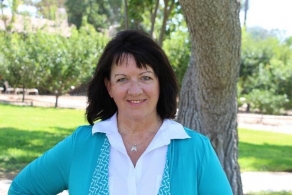
By Helen Horvath
Part 3 in our series on impacts of the COVID-19 pandemic on local nonprofit organizations
July 11, 2020 (Spring Valley) – In an exclusive interview, Noah Homes’ Chief Executive Officer Molly Nocon (photo, left) discussed how the pandemic has affected the nonprofit’s services to developmentally disabled people in San Diego’s East County.
The facility has faced challenges more daunting than most nonprofits. Steep cuts in state funding and a ban on fundraising events due to COVID-19 have impacted revenues. Yet Noah Homes, which provides on-site housing and services, has new costs and responsibilities to protect the health of vulnerable residents while finding creative solutions to help them cope with isolation amid the pandemic.
Noah Homes’ mission and funding
Tucked away on a quiet 11-acre campus off Campo Road between Spring Valley and Jamul, this unique and very important non-profit provides on-site housing and services for individuals with developmental disabilities. Noah Homes has been part of East County and San Diego for 36 years.
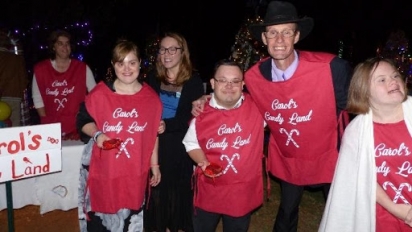 As a 501(c)(3) nonprofit, Noah Homes receives funding from the community through donations and additional funds through the California Department of Developmental Services.
As a 501(c)(3) nonprofit, Noah Homes receives funding from the community through donations and additional funds through the California Department of Developmental Services.
“Noah Homes provides housing and care for 90 residents,” Nocon said. “As part of our mission, we provide advocacy for 330,000-plus people with developmental disabilities, such as Down Syndrome and autism, across California. Our Ark Angel Foundation is a type 1 supporting nonprofit that is structured to benefit Noah Homes only.”
According to Nocon, funds from the San Diego Regional Center and state reimbursement provide “about 65% of what it takes to provide the exceptional care that Noah Homes is known for nationally.´ Noah Homes provides cutting edge advances in Alzheimer’s disabilities” with “capacity to structure programs and services to ensure community involvement and also residents’ independence.”
Pandemic shutdown: residents sheltered in place without visitors
The pandemic has raised significant challenges. “COVID-19 has created a greater need to maintain safe care within the Noah Homes communities,” Nocon said. Noah Homes leadership monitors the care at the various homes on and off campus has worked with case managers to develop an action plan.
“On March 13, 2020 Noah Homes closed the community to outside visitors to comply with County and State Healthcare guidelines. Until Father’s Day weekend residents did not have visitors,” Nocon stated. As part of the COVID-19 safety improvements, “NOAH Homes instituted a daily health check-in for all staff, limited the number of house staff who could work, and created several isolation areas in the community.” As of now, “Residents continue to shelter in place.” Noah Homes recognized that there are “variables outside of our control and we have extensive measures to limit any future spread of COVID-19.”
Noah Homes Programs and Services: Memory care, transportation and more
Noah Homes is the first residential living facility “to open memory care homes specifically for those with intellectual and developmental disabilities.” Nocon stated.
Individuals with Down syndrome face an unprecedented need for specialized memory care, as high rates of Alzheimer’s disease and dementia amongst these individuals follow an increased life expectancy in recent decades.
Noah Homes cares for 20 residents who live in two 5,000 sq. ft., state of the art Memory Care Homes. “Noah Homes living levels give families the peace of mind that a child can start with Noah Homes at age 18 and continue to make it their home until end of life,” said Nocon, adding, “Our homes are residentially licensed; we do not provide any direct medical treatment, but support the residents in their care. We can help with daily living skills, assist with medication needs, and when they need the Memory Care Homes, can provide hospice and almost one-to-one care with staff who are specially trained in care management for dementia and for those with developmental disabilities.”
When asked about the facility’s transportation programs to assist residents to move about the community, Nocon said, “Part of the support provided to residents at NOAH Homes is transportation to work and day programs, volunteer opportunities, all medical appointments, outings, vacations, and a sundry of other activities. Our transportation department has a fleet of 27 vehicles that include a 22-passenger bus. These vehicles combined travel nearly 200,000 miles each year.”
Virtual “Club Noah” launched amid isolation of residents
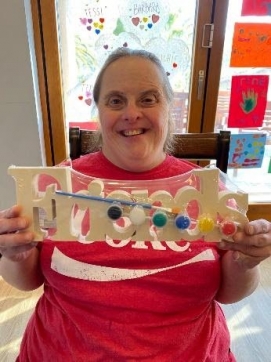 Ms. Nocon discussed the “current lack of activities for many developmentally delayed East County and San Diego community members residing in a smaller setting or who reside at home with their families. Outside of the Noah Homes setting, many developmentally-delayed residents may not have safe access to see friends and family or keep in contact if they do not have a computer.”
Ms. Nocon discussed the “current lack of activities for many developmentally delayed East County and San Diego community members residing in a smaller setting or who reside at home with their families. Outside of the Noah Homes setting, many developmentally-delayed residents may not have safe access to see friends and family or keep in contact if they do not have a computer.”
In response to COVID-19, Noah Homes is launching another program that was in the works called Club Noah to meet up in a virtual forum to socialize, share music, throw a virtual party and many other activities. Club Noah provides the necessary opportunities to mix and mingle for other San Diego community members. This program is in addition to community education services tied to diversity within the community and promotes positive interactions with people with developmental disabilities.
Operational Changes
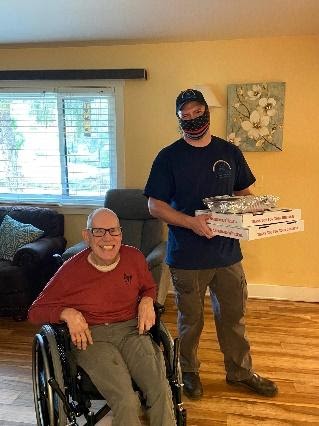 Noah Homes is a Community Care Facility licensed by the California Department of Social Services. COVID-19 has impacted its ability to provide “24-hour non-medical residential care to children and adults with developmental disabilities who are in need of personal services, supervision, and/or assistance essential for self-protection or sustaining the activities of daily living,” said Nocon.
Noah Homes is a Community Care Facility licensed by the California Department of Social Services. COVID-19 has impacted its ability to provide “24-hour non-medical residential care to children and adults with developmental disabilities who are in need of personal services, supervision, and/or assistance essential for self-protection or sustaining the activities of daily living,” said Nocon.
Noah Homes, as a result of COVID-19, “has hired additional staff to manage the added 70 residents back at home as part of an action plan to replicate daytime activities as much as possible. In addition, from college students to parents to employees, NOAH Homes staff stepped up to ask what they could do to help. We created a new schedule of 10 hour shifts for senior staff and to fill in any gaps with minimal overtime needed. We developed extra paid leave to ensure our staff was encouraged to NOT come to work if they had symptoms or potential exposure.”
According to Nocon, ”Noah Homes is currently hiring professionals to work at the facility. We have actually been hiring throughout the COVID as our residents are now with us 24/7. We saw a great reduction in medical availability, but our wonderful General Practitioner, Dr. Fox, checks in with us daily. We have made great use of telemedicine.”
Nocon indicated that Noah Homes initially experienced “food shortages in some items; yet, Albertson’s in Rancho San Diego quickly stepped up to become a part of our shopping network…so that we would not run out of staples. The San Diego Food Bank also zeroed-out two of our shopping bills that totaled around $1,400.00…We are so grateful for the many partnerships we have through San Diego (County).”
Fundraising: Creating a Pivot in Donor Operations
“COVID has certainly made it harder for us and others in our network like St. Madeleine Sophie's Center to fundraise and to find creative ways to get in front of donors,” Nocon stated. Fortunately, she added, “Most donors are very responsive and see the need is bigger now. Our programs also continue to evolve as the state and local rules change; we change with them.”
Noah Homes, in its fundraising efforts is known “as an organization with an established record of exceptional stewardship. It will be fun and safe, whatever it looks like,” Nocon pledged, ”so please keep a lookout on our social pages and at EnchantedVillage.org. We’re always looking for volunteers and sponsors – even virtually!”
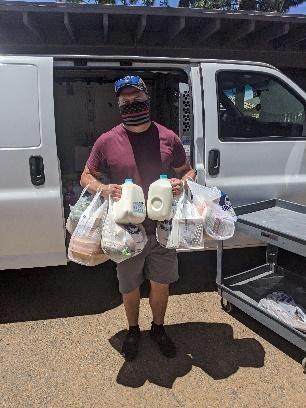 The staff at Noah Homes has become creative to develop funds to support Noah Homes amid budget cuts. Nocon indicated, “The State of California has reduced the budget for organizations such as Noah Homes with a first budget cut on April 30, 2020 that is equal to $200,000 reduction in revenues for Noah Homes. The 2020-’21 state budget taking effect July 1, 2020 has no increase for services.” The state will reassess the overall budget October 1, she noted. If the federal stimulus funds and state revenue are not sufficient, the state of California has “indicated further cuts of 9-19 percent, while we only anticipate staffing and care costs to continue to rise,” Nocon indicated.
The staff at Noah Homes has become creative to develop funds to support Noah Homes amid budget cuts. Nocon indicated, “The State of California has reduced the budget for organizations such as Noah Homes with a first budget cut on April 30, 2020 that is equal to $200,000 reduction in revenues for Noah Homes. The 2020-’21 state budget taking effect July 1, 2020 has no increase for services.” The state will reassess the overall budget October 1, she noted. If the federal stimulus funds and state revenue are not sufficient, the state of California has “indicated further cuts of 9-19 percent, while we only anticipate staffing and care costs to continue to rise,” Nocon indicated.
The budget challenges of Noah Homes are directly tied to how the state manages the annual budget for the California Department of Developmental Services (CDDS). The CDDS budget pays for approximately 65% of Noah Homes budget, which includes federal, state and local government funds. Faced with those deep financial cuts, NOAH Homes has “worked to pivot from in-person events to virtual events that permits close contact with our families and donors. allowing NOAH Homes to raise an additional $100,000 more than last year,” said Nocon.
Noah Homes relies upon community donations and fundraising event to cover the remaining “35% of the annual budget. “The contributions to NOAH Homes includes support for our 13 residents who no longer have family outside of NOAH Homes. Community Stewardship is critical to NOAH Homes’ mission and paying forward to those who will need our assistance in the future,” Nocon indicated.
NOAH Homes, like other nonprofits in our communities, has been impacted by COVID-19 guidelines. NOAH Homes “had to move our biggest fundraiser of the year, Summerfest, from an on property gathering of 600 to a virtual event in less than three weeks,” said Nocon, who added that the success of fundraising during the pandemic is based upon “some old-fashioned fundraising by picking up the phone, letting the donor know our situation, and asking for their help… The response has been overwhelming. So many have not only donated to our Summerfest needs, but the deliveries to the houses from donuts to smart TVs (to support communication) arrives daily.” Noah Homes has met its initial goals for Summerfest fundraising.
 Yet with the looming potential budget cuts by the State, the need to raise funds to support Noah Homes is critical to the community members and their families who are working within the framework of developmental disabilities.
Yet with the looming potential budget cuts by the State, the need to raise funds to support Noah Homes is critical to the community members and their families who are working within the framework of developmental disabilities.
In recent years, Noah Homes has delighted residents and guests by transforming the site into an “Enchanted Village” decked out with elaborate holiday lighting each December. This year, the CEO indicated that “as a result of our initial virtual fundraising success, Noah Homes will “launch a virtual `Christmas in July’ event through Facebook and our website July 20-25, 2020. We will start our sponsorship program for our Noah Homes Enchanted Village (Enchantedvillage.org). “ These annual events typically provide much needed operational funds for the residents and their homes, also employing many of our residents for the event, she noted. “As COVID-19 guidelines change hourly, we have several ideas we are working on that will align with where our community is at – ranging from a full virtual event, to a drive through experience, to onsite with social distancing measures, and more.”
Nocon voiced gratitude to those who have stepped forward to support NOAH Homes amid the challenging COVID-19 environment. “With all of the turbulence and challenges around us, people have been very compassionate, and we are overwhelmed with gratitude to our staff, families and community. East County businesses like RCP Block & Brick doubled their Summerfest sponsorship. Granite Lion Cellars has experienced tremendous loss in business during the shutdown, yet still offered their property as an auction experience for our event and is hosting a virtual wine tasting for us. It has really been a collaborative success story so far and we are counting our blessings,” she said. “Of course, we also recognize that there is a long road ahead.”
In addition to modifying the fundraising process, “our community partners and the San Diego Regional Center has set up supports to help cover the additional staff time expenses, as well as the PPE supplies that we need daily to keep residents and staff safe,” Nocon added. ”We have also received some grants from Grossmont Healthcare Foundation and other Family Foundations who stepped up quickly and pivoted their funding to support (Noah Homes) COVID operational needs. Noah Homes is extremely grateful to these forward-thinking foundations who also saw the need to pivot quickly and support nonprofits like Noah Homes who are front-line essential agencies who keep those already compromised safe and healthy.”
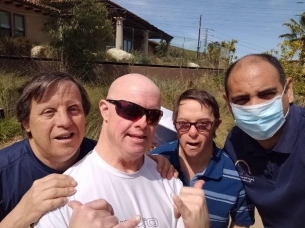 Like everyone else, the residents at Noah Homes are struggling amid the pandemic. Fortunately, the clients at Noah Homes who have a variety of disabilities are safe as a result of the safety measures put in place by Noah Homes and because so many have reached out with donations and friendship via Zoom party calls, sports equipment deliveries, ice cream parties, pen pal letters and more). The key is to embrace our unique differences and similarities as the community navigates through the COVID-19 pandemic. Noah Homes is “thankful to the community,” Nocon concluded.
Like everyone else, the residents at Noah Homes are struggling amid the pandemic. Fortunately, the clients at Noah Homes who have a variety of disabilities are safe as a result of the safety measures put in place by Noah Homes and because so many have reached out with donations and friendship via Zoom party calls, sports equipment deliveries, ice cream parties, pen pal letters and more). The key is to embrace our unique differences and similarities as the community navigates through the COVID-19 pandemic. Noah Homes is “thankful to the community,” Nocon concluded.
Despite the challenges posed by the pandemic and lockdown to protect vulnerable residents, Nocon believes that Noah Homes is “successful because so many in the community believe in our mission of exceptional service to adults with disabilities. We hope that everyone stays safe,” she concluded, “and when we are on the other side of COVID, we welcome you” to visit the community at Noah Homes.
You can learn more about Noah Homes’ programs and services to the community, or donate to support the nonprofit organization at its website.
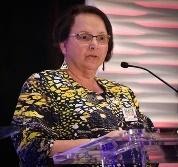 Dr. Helen Horvath is a psychologist, organizational development consultant and published author on a variety of psychology and business topics. As a speaker, she has presented at the American Psychological Association Annual Conference, Society of Industrial and Organizational Psychology, and other key professional organizations. She is a former marriage and family therapist and published a relationship book entitled “Put a Period to IT: When Divorce is the Option.”
Dr. Helen Horvath is a psychologist, organizational development consultant and published author on a variety of psychology and business topics. As a speaker, she has presented at the American Psychological Association Annual Conference, Society of Industrial and Organizational Psychology, and other key professional organizations. She is a former marriage and family therapist and published a relationship book entitled “Put a Period to IT: When Divorce is the Option.”
East County Magazine gratefully thanks the Facebook Journalism Project for support through its COVID-19 Local News Relief Fund Grant Program to help make this reporting possible. #FacebookJournalismProject.
You can donate to support our local journalism efforts during the pandemic at https://www.EastCountyMedia.org/donate.








Recent comments